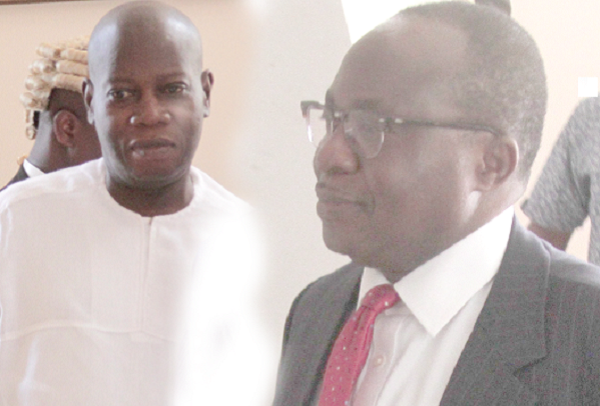
Supreme Court orders NCA suspects to file cases - A-G to also file response
The Supreme Court has become the new arena for the ongoing legal battle between the Attorney-General (A-G) and five persons accused of embezzling $4 million belonging to the National Communications Authority (NCA).
At its sitting yesterday, the apex court ordered the accused persons — Eugene Baffoe-Bonnie, a former Board Chairman of the NCA; William Tetteh Tevie, a former Director General of the NCA; Nana Owusu Ensaw, a former board member of the NCA; Alhaji Salifu Mimina Osman, a former Deputy National Security Coordinator, and Mr George Oppong, a private businessman — to file their statements of case within two weeks.
Advertisement
The seven-member panel, presided over by Mr Justice William Atuguba, further ordered the A-G to file its response two weeks after it had been served with the respective statements of case of the accused persons.
Other members of the panel were Mr Justice Julius Ansah, Mrs Justice Sophia Adinyira, Mr Justice Jones Dotse, Mr Justice Anin Yeboah, Mr Justice Sule Gbadegbe and Mr Justice Yaw Appau.
From High Court to Supreme Court
Baffoe-Bonnie, Tevie, Osman, Ensaw and Oppong were standing trial at the Accra High Court for allegedly embezzling the $4 million in a deal sponsored by the NCA for the purchase of surveillance gadgets for the National Security.
On February 1, 2018, the High Court, presided over by Mr Justice Eric Kyei-Baffour, suspended proceedings of the trial and referred a constitutional issue raised by the accused persons to the Supreme Court for interpretation.
Counsel for Baffoe-Bonnie and Oppong filed an application seeking the Supreme Court to interpret the true meaning and intent of Article 19 (2) (e) and (g) of the 1992 Constitution which borders on the right to a fair trial.
The lawyers had argued that per Article 19 (2) (e) and (g), their clients were entitled to all the documents the prosecution intended to rely on in the trial, which began on January 16, 2018.
Issues sent to Supreme Court
Article 19 (2) (e) of the 1992 Constitution states: “A person charged with a criminal offence shall be given adequate time and facilities for the preparation of this defence.”
Article 19 (2) (g) states: “A person charged with a criminal offence shall be afforded facilities to examine, in person or by his lawyer, the witnesses called by the prosecution before the court and to obtain the attendance and carry out the examination of witnesses to testify on the same conditions as those applicable to witnesses called by the prosecution.”
The issues referred to the Supreme Court for interpretation are whether, on a true and proper interpretation of Article 19 (2) of the 1992 Constitution, the accused persons are entitled to pre-trial disclosure, and if yes, at what point should the prosecution make the disclosure, in view of the rule that accused persons must be put before court within 48 hours after arrest.
The third issue referred to the apex court is whether or not the accused persons are entitled to disclosure of documents that will be tendered in evidence during the trial.
Facts of the case
All the accused persons have pleaded not guilty to various counts of causing financial loss of $4 million to the state.
The High Court had granted each accused person a $1-million bail, with three sureties, and directed them to surrender their passports to the registrar of the court.
According to the facts of the case, as presented by the A-G, Baffoe-Bonnie, Tevie, Ensaw and Osman were allegedly aided by Oppong to engage in the criminal act.
It said the previous administration had contracted an Israeli company, NSO Group Technology Limited, to supply a listening equipment at a cost of $6 million to enable the authorities to monitor conversations of persons suspected to be engaged in terror activities.
A local agent, Infraloks Development Limited, charged $2 million to facilitate the transaction, bringing the total sum to $8 million.
The facts explained that the National Security did not have the money to fund the transaction and for that reason the NCA, which had supervisory jurisdiction over the use of such equipment, was asked to fund the project.
It said $4 million was withdrawn from the NCA’s account, while $1 million out of the withdrawn amount was deposited into the account of the Israeli company.
The A-G explained that the remaining $3 million was lodged in the account of Oppong, who acted as a representative of the local agents, Infraloks Development Ltd.
According to the A-G, Osman allegedly fronted for the entire deal.
The accused persons were said to have later laundered the amount for their private benefit.



